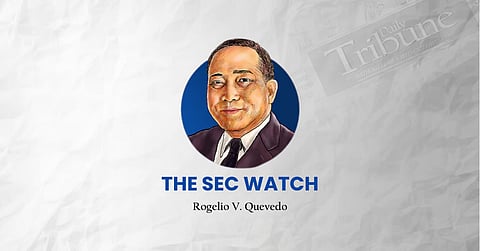
- NEWS
- the EDIT
- COMMENTARY
- BUSINESS
- LIFE
- SHOW
- ACTION
- GLOBAL GOALS
- SNAPS
- DYARYO TIRADA
- MORE

The recent controversies surrounding flood control projects once again exposed a painful truth: public works remain vulnerable to corruption and manipulation, despite the numerous safeguards already enshrined in law.
The Philippine Contractors Accreditation Board (PCAB) has required the strict capitalization of construction firms.
To be classified as AAAA, a company must have at least P1 billion in paid-up capital, an amount designed to ensure that only well-equipped and financially capable contractors handle the country’s most significant and most critical projects.
These requirements must not be treated as mere formalities. They exist to filter out shell entities and weak firms that could not possibly deliver billion-peso undertakings.
Yet loopholes persist. The widespread practice of subcontracting often reduces government projects to layers of hand-offs, with each layer eroding accountability.
What begins as a project awarded to a qualified contractor may, in practice, be executed by smaller, underqualified entities.
This not only breeds inefficiency but also opens the door to ghost projects. The pernicious practice of renting out contractor licenses corrodes the system further, transforming regulatory compliance into just another transaction.
At the end of these schemes lies a public left with substandard work, or worse, no work at all.
The New Government Procurement Act (Republic Act 12009) recognizes this risk and seeks to address it by mandating the strict disclosure of beneficial ownership.
By requiring firms to identify their true controlling individuals, the law strikes at the heart of shadowy arrangements that conceal conflicts of interest and facilitate corruption.
Blockchain technology also offers a new line of defense. The proposal to introduce blockchain into the government’s budgetary system provides a path toward greater transparency in procurement and project implementation.
Immutable, traceable, and tamper-proof records of financial flows and contract execution would make it exponentially harder, if not impossible, to manipulate figures or conceal irregularities.
If extended to infrastructure projects, such a system would allow the public and regulators to monitor, in real time, how every peso of taxpayer money is spent.
The Securities and Exchange Commission has tightened oversight over the corporate structures of contractors and is rigorously policing disclosures of ownership and financial standing.
Beneficial ownership disclosure is not just a bureaucratic requirement; it is a shield against corruption.
Behind many construction firms lurk hidden hands, including politicians who quietly control or benefit from companies bidding for government projects.
Without full transparency, these conflicts of interest thrive unchecked, allowing those in power to profit from public funds while projects rot.
Mandating and enforcing beneficial ownership disclosure strikes directly at this scheme, stripping away the corporate veils that protect political patrons and their proxies.
Flood control is not just another line item in the budget. It is a lifeline for communities vulnerable to rising waters and stronger typhoons.
Corruption in these projects is not victimless; it drowns entire neighborhoods, destroys livelihoods, and puts lives at risk.
If the system tolerates circumvention, ghost projects will continue to haunt the public sector. But if rules are upheld, capital requirements are strictly enforced, subcontracting loopholes are closed, license rentals punished, beneficial ownership declared, and technology harnessed for transparency, then corruption will find fewer shadows to hide in.
Only then can flood control projects live up to their purpose — protecting the people, not enriching a few.
